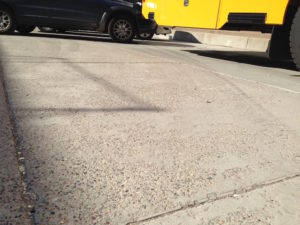Telling someone at a neighborhood party that you specialize in concrete performance is an effective way to end the conversation before it gets started. People can’t imagine there’s anything to know about concrete. But we’ve all seen bad concrete. We’re dedicating this blog to describing why bad concrete happens and how to avoid it.
The nation’s crumbling infrastructure has been the subject of much discussion. Corroding reinforcing bar causes rust stains  and spalling. Cracks appear in concrete that’s only a few days old. Is there something that can be done about it? Yes!
and spalling. Cracks appear in concrete that’s only a few days old. Is there something that can be done about it? Yes!
If you want great concrete performance, or if you want to repair a concrete structure, you need to understand how it works. And if you look into it, concrete is surprisingly complex and interesting.
A crack pattern you can see with the naked eye, sometimes even from a distance, can originate in the chemistry and physics of the constituent materials – cement, water, rock, and sand – and their interactions with each other and their environment.
This blog will help develop your knowledge of concrete and discern when you need to call Beton to assist you in anticipating or solving concrete performance challenges.
Prevention and testing key to ensuring high concrete performance
If you know what to look for and what questions to ask, you might be able to predict whether an aggregate is likely to cause popouts, or evaluate its suitability for a project. Or determine if concrete is likely to scale. Our blog posts will help you keep watch over the specifications, timing, and techniques that ensure a successful project outcome.
Some projects require more in-depth knowledge, however, and that’s where Beton Consulting Engineers comes in.
For instance, thick sections of concrete are needed in everything from massive bridge piers to MRI radiation shielding at a hospital. But cement hydration generates heat and in a thick section, the difference in temperature between the inside and face cause stresses. If there’s too much of a temperature difference, the concrete cracks.
We know how to develop a thermal control plan to manage heat of hydration.
So we’ll write a blog post or two about it so you understand what it is.
In the end, improving concrete performance is often about making our infrastructure durable. We’re using this blog to cover a variety of topics to boost your knowledge and project results.
Beton knows the science behind concrete. We’d like to be your partners in designing good concrete to reduce the problems you’re likely to encounter.
And if something went wrong with a project and you need to figure out what to do about it, we can help you there, too, with our expertise in failure analysis.
Sustainability
Sustainability is very much on our minds as we design, specify, and test concrete. We can help you meet LEED or CALGreen requirements. We can also determine the embodied carbon in your concrete or write an environmental product declaration for you.
